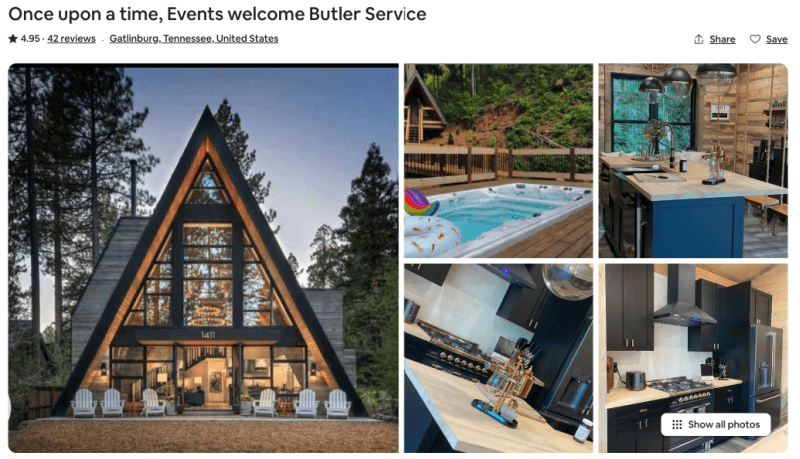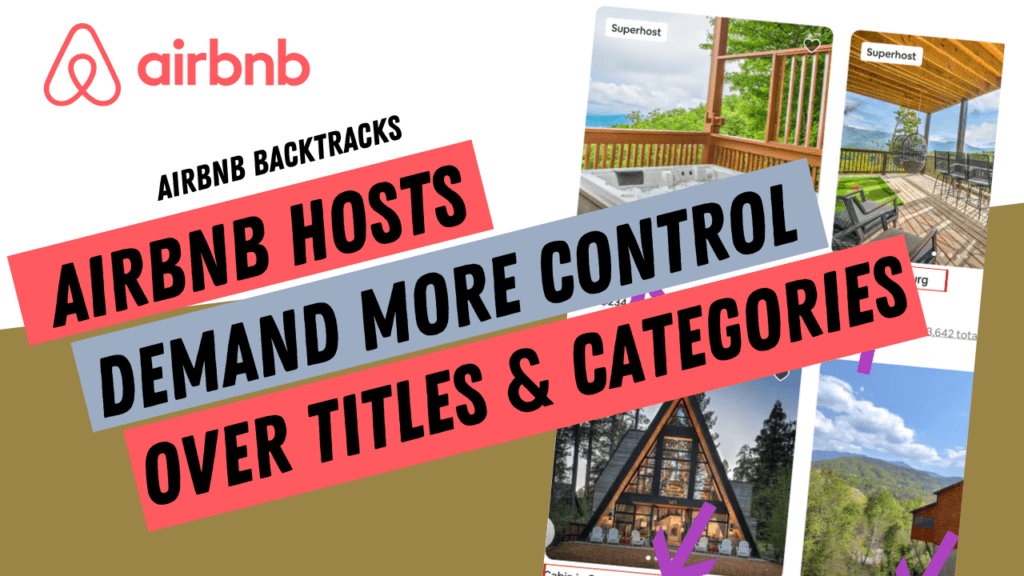Since the release of the Summer 2022 Update, Airbnb hosts have shared recurring concerns about losing control over their listings. First, the new Airbnb Categories search results replaced listing titles carefully crafted by hosts with Airbnb-generated super short titles (“e.g. Condo in Boca Raton). Second, some hosts experience increased difficulty in finding their own listing within search results, deploring a possible drop in visibility and bookings. Third, the number of reviews collected by a listing has disappeared from search results. Last, hosts feel that they have neither control nor information over which category (-ies) Airbnb attributes to their property, feeling that their listing may be unfairly categorized and miss out on interested travelers. Airbnb has recognized these concerns and started looking at measures to correct course.
Dear Airbnb, the noise around the loss of control over listing titles was easy to predict
When Airbnb released its Summer 2022 Update, we noted that it was a major site and app redesign that was affecting many pieces of its services. We expressed that, given the size of the changes, the company could not predict everything that would ensue. Usually, tech companies make gradual changes, A/B test them, and make sure that the result of new experiments is not impacted by other experiments taking place at the same time. Airbnb took the bold decision to launch a complete redesign, which must have taken a lot of effort in terms of coordination.
BEFORE: Listing title (remains unchanged on the listing page itself)
Let’s take the example of this listing for an A-frame-like luxury property in Gatlinburg, Tennessee. The listing title created by the owner is “Once upon a time, Events welcome Butler Service.” When reading the title, you get the idea that this is no ordinary cabin.

AFTER: Listing title down to its most simple expression
Within the Airbnb Categories search result, the original title has now been replaced with “Cabin in Gatlinburg”. The new title has been created by Airbnb. It is shorter and easier to compare with other short listing titles, but the new wording does not convey the same information.

Yet, run-of-the-mill product marketing best practices, such as showing screenshots of the upcoming changes to hosts and noting their reactions, could have helped Airbnb see and prevent some of the issues. For instance, Airbnb hosts feel that their own their listing, from the photos to the description, the title to the amenities mentioned. The most engaged (and vocal) hosts spend a lot of time crafting their title, as they believe that they can use it to attract the type of guests they want. They also think that using certain keywords and icons can help with SEO and increase click rates, and thus bookings. So, replacing these listing titles with machine-generated ones may be better for the guest experience, as it makes it easier to compare properties, but it makes some Airbnb hosts feel that they are losing control.
To be fair, Airbnb has probably talked to Airbnb hosts before introducing the changes. A lot of regular hosts may have not cared much about them. Yet, the company may have discounted the negative chatter from its most engaged hosts on the company’s online forum and across various Facebook groups.
Finally, the fact that Airbnb is recognizing that there some Airbnb hosts have been unhappy about the changes should come to the company’s credit. It is not reversing all the changes but looking for ways to reconcile its business goals with host preferences.
Airbnb listing titles: Host-written titles are back + New writing guidelines (e.g. 32 characters)
First, starting June 30, Airbnb is reinstating listing tiles crafted by its hosts to search results. Here’s what Airbnb has to say about it:
We removed custom titles in order to create uniform descriptions across Airbnb that make it easier for guests to view and compare stays. In some cases, longer titles stretched over several lines or included emojis that might not have been relevant to the listing. These inconsistencies complicated searches and sometimes created a poor experience for guests.
Since the launch, you’ve provided a lot of feedback about the changes, including many requests to bring listing titles back to guest search results. We understand why you’re so passionate about this issue: Your listing title is one of the first things guests read in search results and an opportunity to call out what makes your space unique.
Starting June 30, your listing titles are returning to guest search results.
Second, Airbnb is introducing new guidelines for writing an effective title that can help a listing stand out in search, set expectations for guests, and create interest in booking a space. Airbnb is recommending hosts used shorter listing titles that avoid repetitions, without emojis and special characters.
Here are the exact recommendations from Airbnb:
Shorter titles (32 characters max recommended)
Guests search Airbnb using all types of devices with screens of different sizes. A title that works well in a web browser may be too long for guests scrolling listings on the mobile app.
Longer titles are automatically shortened in search results and the remaining part of your title is replaced with an ellipsis. For example, “Country cabin with lake view, firepit, boat ramp” becomes “Country cabin with lake view…”
Character limits help make sure your title gets fully displayed on desktop and mobile devices. Guests on the go tend to search using mobile phones, which means only 32 characters appear. If your title is longer than 32 characters, put the most important info first.
Here are three good examples of short listing titles:
- Modern loft overlooking downtown
- Cozy mountain hideaway for chefs
- Beachfront villa near Año Nuevo
Avoid CAPITAL LETTERS
Sentence case calls for capitalizing only the first letter of the first word in your title. Title case (where you capitalize most words) can be overly formal, and ALL CAPS tends to come across as yelling. To give guests a better search experience, avoid using uppercase letters in other words of your title unless it’s a proper name such as a city. You can also make exceptions for abbreviations, such as UK or an airport code like LHR.
Here’s an example of how not to use capital letters in a listing title:
- NEW Furnishings HUGE POOL Great Views
Here are three good examples of listing titles in sentence case:
- Seaside shack at Bondi Beach
- Romantic Victorian guest room
- Eco-friendly studio near LAX
No emojis or special characters
Emojis and symbols can mean different things to different people around the world, and using them could be confusing or misleading. For example, a thumbs-up can be interpreted as a sign of approval, the number one, or an offensive gesture.
To make your listing title friendlier and easier to read, stick with simple and descriptive words about your place. Using special characters (like !, #, or *) is fine, but repeating them for emphasis (like !!! or ***) isn’t. To separate ideas, try commas with spaces or a single slash without spaces.
Here’s an example of what not to do:
- ****Ski and golf chalet****!!!
Here’s a better way to write this:
- Ski/golf chalet & private yard
Avoid repetitive information, only mention unique details
In most cases, it’s not necessary to repeat any info that’s already provided to guests in search results, such as your city or town, or the total number of beds. Instead, use your listing title to add unique details that can help attract attention.
For example, if your listing is in Buenos Aires, you could include your neighborhood, like “Recoleta,” in your listing title. If it’s in Florence, Italy, you could specify “near Uffizi” or another landmark that’s close to your place. This helps clarify your space’s whereabouts for guests. Or, if you have a dedicated office space, you might want to highlight “work-friendly” in the title.
You can also omit the word “new” from a new listing title because this info is already communicated to guests on a badge in search results.
More information for hosts on which Airbnb Categories their listing falls under
Since the Summe 2022 update, a lot of hosts have been looking for ways to influence and optimize the Airbnb Categories under which their listings fall. For the moment, there is no official way to:
- See under which categories Airbnb has put your listing
- Decide to which Airbnb category your listing belongs to
- Remove a listing from an Airbnb category
- Make sure that all of your similar listings (e.g. all your treehouses) appear under the same category.
This lack of information and control has driven some hosts to spend hours looking for their listing under each and every category, trying to understand why one of their chalets would show up under one specific category while its twin chalet would not.
Also, as we discussed in the video below, Airbnb Categories seem to have been created for non-urban markets (e.g. treehouses, cabins, amazing pools) while urban listings are lacking relevant categories to stand out (e.g. no “Remote work” or “Live like a local” categories).
To address some of these issues, Airbnb is doing two things:
- Looking at ways to show to hosts to which Airbnb Categories their listings belong (“we’re exploring ways to let you check what category your listing may be in. We’ll provide details in the months ahead.”). Note that, as Airbnb may be calculating in real-time into which category to put a property, depending on factors that may change from one week to another, it may result in a situation where hosts are surprised to see their listing belong to one category one day and to another at a later date.
- Collaborating with hosts to develop a process for creating new categories, such as “sustainable homes”, “family-friendly listings”, “downtown properties” and “stays with remote office setups”.
Helping hosts find their listing in search results + maybe reinstating the review count in search results
Some hosts have complained that they could not find their listings under any Airbnb Category. First, Airbnb is trying to size the issue: The majority of Airbnb users do not use categories to discover listings. They continue to book stays by entering a specific destination and travel dates in search. Once guests enter a location, they are using the “All homes” tab—just as they did previously—to view all stays available in a particular location and book a listing that’s right for them. At the moment, Airbnb is looking at ways to make the “All homes” tab more prominent when guests search a location.

Second, Airbnb is also looking at improving the display of categories, map searches, and how to best show review counts.
So, Airbnb is gathering feedback to improve its product, which is good. Given the sheer size of the Summer 2022 Update, we expected that some things would do great and some not. Yet, it is surprising that Airbnb would have underestimated how much ownership hosts think they have over their listing title. Now, Booking.com, which does not allow hosts to write the description of their own listings (Listing titles are generated by machines at Booking.com), could get away with that. Not Airbnb.







